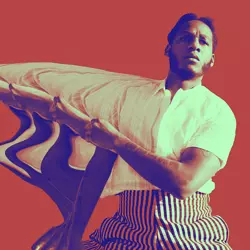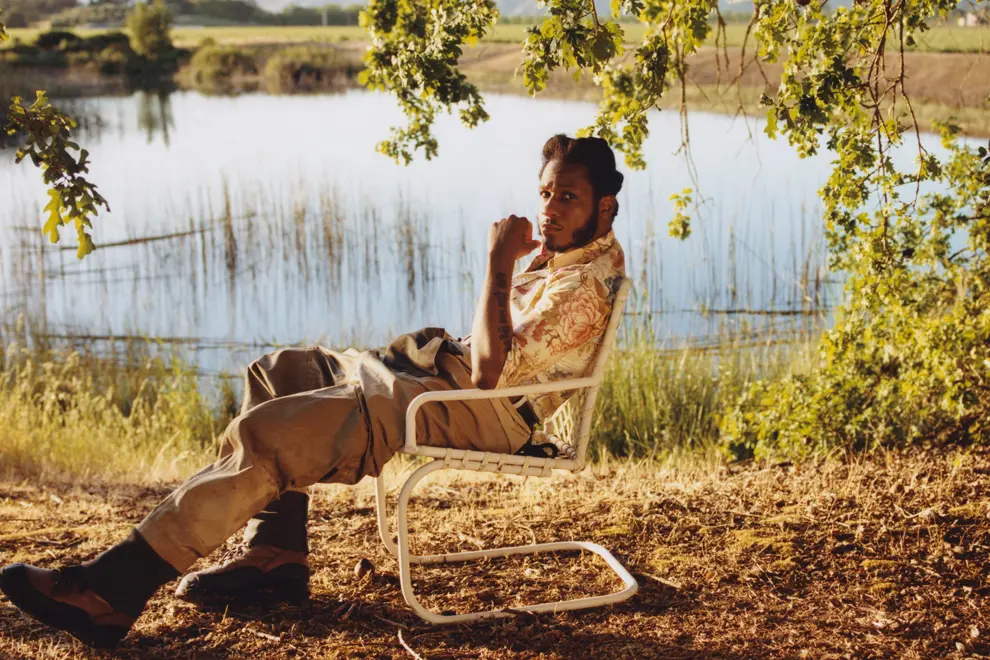 Leon Bridges
Leon BridgesLeon Bridges has performed alongside Stevie Wonder at the White House as part of then-president Barack Obama's 55th birthday celebrations. He also took home a Grammy in 2019 for Best Traditional R&B Performance, thanks to Bet Ain’t Worth The Hand (from his second LP, 2018’s Good Thing).
Bridges’ rapid ascent from dishwasher at Rosa’s Café while living at his mom’s house to global superstar has been well documented.
In late 2014, Bridges posted a demo of his song Coming Home on SoundCloud, which attracted local airplay. Soon, several record labels expressed interest. Then, in 2015, Bridges’ debut album – also called Coming Home – rocketed up the Billboard 200 chart, peaking at #6.
Anyone who has witnessed Bridges live or clocked one of his film clips already knows that he also comes from a dance background; he studied ballet, modern, and African dance in college. See If It Feels Good (Then It Must Be), which was choreographed by Darcy Wallace, an Australian freelance contemporary dance artist, choreographer, and Ashtanga yoga teacher based in London.
He may sing like an angel and dance like Gene Kelly – who he also draws style inspo from – but Bridges, a self-confessed introvert, is an extremely humble artist. “I mean, I kind of have a tough time just being in the limelight and under a microscope,” he admits, sporting dark shades for the duration of our Zoom chat.
But even Bridges himself recognises that his new album, Leon, contains “some of my most excellent work yet”. And we couldn’t agree more.
Don't miss a beat with our FREE daily newsletter
In a letter to fans announcing his upcoming fourth LP, Bridges revealed, “I started writing pieces of it as far back as Gold-Diggers Sound” – his previous album, which dropped back in 2021. Since these song sketches “didn’t fit” alongside that record’s R&B-leaning material, Bridges has said he “tried moving on” before eventually acknowledging, “I couldn’t shake them because they're part of me”.
“I started working on this album almost five years ago,” Bridges says of Leon’s inception. “I was working in Nashville – we kind of go back and forth from Nashville to LA, and I just got burnt out on those places and needed a change of scenery. And so I was just like, ‘Yeah, Mexico would be great.’ And so we landed on the El Desierto studio out there. And what I loved about it was that it was disconnected from all the distractions and immersed in nature, you know? And, yeah, a really serene and peaceful place to be in.”
El Desierto, where Leon was recorded and produced, is situated in an idyllic location on the outskirts of Mexico City where the music video for Peaceful Place – the album’s calling card – was also shot.
As well as giving viewers a fly-on-the-wall glimpse into Leon’s recording process, this film clip also shows Bridges sitting down to enjoy some delicious communal feasts. “Yeah, that was one of the perks,” he smiles. “We got home-cooked meals – breakfast, lunch and dinner – every day. I mean, just growing up in Fort Worth, Texas, I’ve always been in proximity to Mexican culture. I’ve always really loved Mexican culture, and it definitely felt like home.”
Leon opens with a powerful statement in When A Man Cries – even the song title itself. “Fall apart when I try to be strong/ Gotta learn how to cry…” – on whether he was encouraged to hold back the tears when he was growing up, Bridges offers:
“I think with men across the board, but also in the Black community, we don't really have the space to express our emotions out of fear of being deemed as weak. And I felt that sentiment was a message that was very much needed – just like the tears falling being a metaphor for letting go. And, I mean, I think there's bravery in vulnerability, you know? And I think that's a message that all people need to hear, but definitely men specifically.”
When asked whether he recalls being moved to tears by music from an early age, Bridges takes a second before responding, “Man, not growing up, but the only artist that has brought me to tears is this artist named Townes Van Zandt. And, I dunno, it's not even necessarily the songwriting and the stories; it's more so just the mood of the songs. And, you know, he was an artist that I would listen to when I was in a really tough time. Listen to Townes Van Zandt; he's a great artist.”
For those among us who may be unfamiliar with Van Zandt’s work, we ask Bridges to recommend an entry point: “I would say listen to Waiting Around To Die, his most popular song.”
So, can Bridges please identify the species of bird we hear chirping away during Leon’s gentle, acoustic-strummed interlude, Teddy's Tune?
Bridges chuckles before lamenting, “I wish I could! I mean, that was a moment where, I guess, my collaborators got some audio from outside and incorporated it in the track subsequent to me laying down the guitar part. We kind of did everything in pieces. I wasn't even aware that they were gonna incorporate how the outdoors sound in the song, and it ended up being really cool.”
Calling out that childhood buddy who constantly borrowed tapes only to lose them, playing Rock Paper Scissors to determine “who would be the first to play Nintendo 64”, repeatedly driving past his first love’s house – Panther City exemplifies the level of autobiographical detail Bridges peppers throughout Leon.
“I'm specifically reminiscing about my experience on the Southside of Fort Worth,” Bridges confirms of this album highlight. “It was a very dangerous and rough place to grow up in, and so I wanted to paint a picture of the beauty of that place in the midst of the chaos. It's about my story and my experience in the summertime in that area, but it’s also about the people around me that made an impact on me.
“I guess going into a song, there's times where I don't know exactly what I want to write about. With that song in particular, I started out just playing this melody, and to me, it felt like those family gatherings. It felt like the summertime from my childhood, and I wanted to give people a glimpse into the place that I really love and that shaped me.”
But Panther City also touches on Fort Worth’s dark underbelly: “All the crackheads and the prostitutes on Rosedale/ My father said go straight home/ Or I’d catch Hell…”
“I'm very grateful that my father was more lenient than my mom,” Bridges reflects. “But he still kept me and my brothers pretty sheltered. And I guess I had to learn the hard way, you know? I tried to be rebellious and hung out with one of the kids in the neighbourhood that I wasn't supposed to hang out with, and my dad found out and I got in trouble from that moment. But, yeah! I mean, I’m very grateful that my dad [ensured] we had a sense of security even in the midst of all that.”
Although Bridges’ parents separated when he was seven years old, he stresses, “I had a really beautiful childhood. I had great parents.”
Of the inspiration behind his recently released latest single, That's What I Love, Bridges shares, “I always love when people say, ‘Oh, man, he could sing me the phone book.’ And so [writing That's What I Love] was an exercise to list some of the most mundane, everyday things – just stuff that I dig. And I guess it's about, you know, there’s so much noise and so many distractions in this world, and you can't lose sight of what is meaningful.
“I really love those natural highs in life. And, for me, I love hanging out at the beach. I love being around trees and just being outside – whether it's, like, working out or playing guitar or doing some writing – and it's those things that really keep me grounded.
“I think we all kind of took all that for granted and, you know when everything was stripped away [during Covid-related lockdowns], all we were left with is everything that comes from God, you know? So, yeah, for me, it was nice to be able to slow down a little bit. And, I mean, not to be oblivious to how everybody was experiencing that time, but it was very healing for me. It was just nice to be able to slow down and be able to reflect.
“So, some good things transpired from Covid, I would say. And I was able to get closer to my mother and my sister during that time… My mom and my sister do my hair, so it was like our bonding moment, and still is.”
“Bourbon, Cadillacs, blue denim/ Making love on the beach in the mornin’/ Springtime on the Trinity River, gold jewellery/ All black penny loafers…”
“I love vintage cars,” Bridges extols of including Cadillacs in his “stuff that I dig” list. Our discussion then turns to penny loafers, which Bridges has rocked since his Coming Home days – probably even before. We actually had no idea about the tradition of placing actual pennies in the loafer’s slots! He laughs before enlightening, “It’s from back in the ‘50s. It’s just an aesthetic thing.”
On creating Leon – his most personal work to date – Bridges explains, “I guess I've always had a fear of being vulnerable in my music, and so I don't like the feeling of being transparent and putting that honesty in the music. But I had to come to grips with, like, it's okay to give people a piece of yourself without giving everything.
“I think there's a lot of relatability in the Leon album and I hope it can inspire people to just focus on what's meaningful and what's important. I love that it gives the listener an opportunity to be vulnerable and heal from some of the stories that are unique to me. ”
Leon is out now via Columbia Records. Leon Bridges will tour Australia in January 2025.
Leon Bridges
2025 Australian Tour
With Special Guests Glass Beams, Los Bitchos, & Maple Glider
Friday 17 January - Riverstage, Brisbane QLD
Sunday 19 January - Centennial Vineyards, Bowral NSW (A Day On The Green)
Tuesday 21 January - ICC Sydney Theatre, Sydney NSW
Thursday 23 January - Sidney Myer Music Bowl, Melbourne VIC
Saturday 25 January - Mt Duneed Estate, Geelong VIC (A Day On The Green)



















